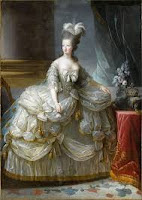Marie Antoinette (1755 – 1793)
Marie Antoinette was the last queen of France before the French Revolution. She was born on November 2, 1755, in Vienna, Austria, as Maria Antonia Josepha Johanna von Habsburg-Lothringen, the youngest daughter of Empress Maria Theresa of Austria and Holy Roman Emperor Francis I.
Marie Antoinette's marriage to Louis-Auguste, the Dauphin of France, was arranged as part of a political alliance between Austria and France. She married him in 1770, at the age of 14, and became the Dauphine of France. After Louis-Auguste ascended to the throne as King Louis XVI in 1774, Marie Antoinette became the Queen of France.
Marie Antoinette was known for her lavish spending and extravagant lifestyle, which earned her the nickname "Madame Deficit." She was also criticized for her frivolity and perceived lack of concern for the welfare of the French people. Her reputation was further damaged by rumors of her infidelity and her alleged involvement in political intrigue.
During the French Revolution, Marie Antoinette and her family were imprisoned. After several failed attempts to escape, they were put on trial for treason. Marie Antoinette was found guilty and executed by guillotine on October 16, 1793, at the age of 37.
Marie Antoinette's early life was marked by her privileged upbringing in the Austrian court. She was educated in a wide range of subjects, including history, music, and languages. She was also taught to be an accomplished dancer and musician.
In 1770, Marie Antoinette married Louis-Auguste, the Dauphin of France, in a grand ceremony in Vienna. She arrived in France to much fanfare and excitement, but her initial years as the Dauphine were difficult. She faced criticism for her Austrian background and was expected to produce an heir quickly.
After Louis-Auguste became King Louis XVI in 1774, Marie Antoinette became the Queen of France. She immediately set about remodeling the palace of Versailles, where the royal court was based, and embarked on a lavish spending spree. She was known for her love of fashion, gambling, and entertainment.
Marie Antoinette's spending habits were a major source of criticism. France was in financial crisis, and the country's poor economic situation was exacerbated by the expensive wars Louis XVI had fought. The queen's extravagant lifestyle was seen as a symbol of the royal family's disregard for the plight of the French people.
Marie Antoinette was also criticized for her perceived frivolity and lack of concern for the welfare of the French people. She was accused of spending her time at court engaging in petty intrigues and ignoring the suffering of the poor. Her perceived indifference to the plight of the French people contributed to her unpopularity and helped fuel the revolutionary fervor that would eventually lead to her downfall.
During the French Revolution, Marie Antoinette and her family were imprisoned. They attempted to escape in 1791 but were caught and returned to captivity. In 1792, the French monarchy was abolished, and the royal family was put on trial for treason.
Marie Antoinette's trial was a foregone conclusion. She was found guilty of crimes against the state and sentenced to death by guillotine. On October 16, 1793, she was executed in front of a cheering crowd. Her last words were reportedly, "Pardon me, sir, I meant not to do it," after she accidentally stepped on the executioner's foot.
Marie Antoinette's legacy has been the subject of much debate. She has been portrayed as a selfish and extravagant queen who cared little for the suffering of the French















No comments